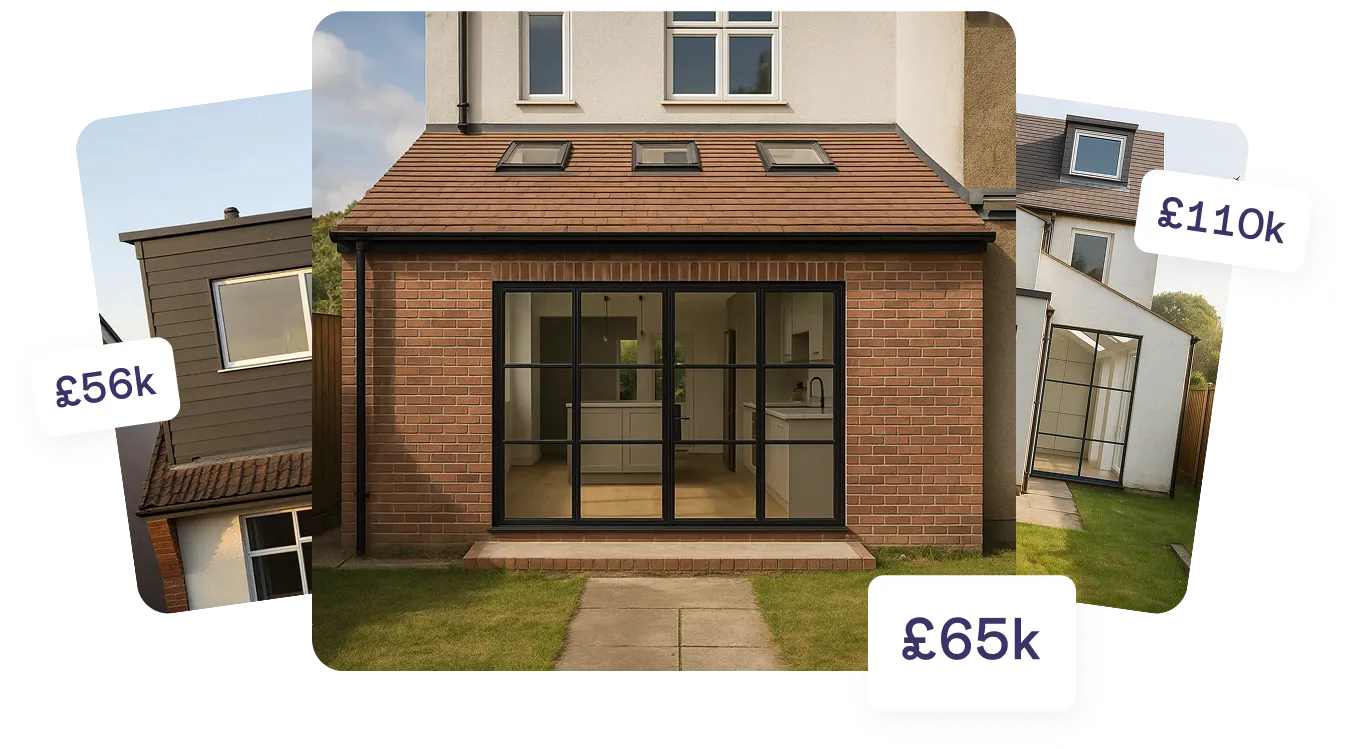Using your savings
If you don’t already have the money in place, you might be considering saving up for your intended project. This might be an achievable goal for a small project, which costs less than £20,000.
Such projects might include…
- Renovations
- Garage conversions
- Room in loft conversions
- Or small extensions, outside of premium areas (such as London)
Alongside your savings, some homeowners choose to make up any financial shortcomings by using their credit cards. Again, this will only be possible for small amounts, as most card limits won’t cover the full cost of a project. However, not all of your outgoings will be going out in one large-sum. A credit card might offer a quick solution for those services you might need before construction begins: architectural work, planning fees, and surveying costs.
Pros: If you’re able to pay off the credit card quickly, this route provides a 0% interest way of funding your project, depending on your provider.
Cons: Putting together a large sum of money can take time and the housing industry waits for no man. You might find, a few years down the line, you’re no longer able to commit as much money to the fund as you were once able to. Or, as you put more and more money away, the cost of your dream project also escalates. Don’t forget, inflation affects the cost of labour and materials each and every year.
Alongside this, what you require might evolve too. You might only require a small extension now but, in 10 years time, this might be redundant as your family grows too. Suddenly your extension needs to be twice the size and your funds just can’t stretch to this new goal.
Using an unsecured personal loan
Another option you could go for is an unsecured personal loan. As with savings and credit cards, an unsecured personal loan works best for smaller projects. You don’t want to be taking on long-term debt of more than £30,000 with this route, otherwise you could face some pretty scary repayment plans.
To get the best deal, you’ll not only need to consider what rates are on offer but also the state of your credit rating. If both seem favourable, you might find this a good option for your home, as typically, there are no arrangement or set-up fees. You’ll also have more short-term options when it comes to your repayments than you would with a remortgage - ideal for anyone looking to quickly pay off the debt. On most of these loans, you can either opt for one, three, or five years.
Pros: You can choose a short-term plan to pay off your debt and won’t have to cover the cost of set-up fees.
Cons: If you have a bad credit history or the market is struggling, it’ll be difficult to secure a good rate. The interest rates will also be unfavourable and limited for projects above £30,000. As this is short term lending, typically over 2-5 years, the repayment amounts can be quite high.

Remortgaging or using a further advance
For anyone taking on a major project costing more than £30,000, then it’s recommended that you look for a loan that uses the existing equity in your house to secure the funds. This could either be through a remortgage of your property or what’s known as a ‘further advance’.
By using the equity in your home, you’ll be able to secure a low-interest rate loan that tacks onto your existing monthly payments.
For example:
If you have a property worth £300,000 with an existing mortgage of £150,000 over 25-year term with an interest rate of 1.5%, your monthly mortgage payments would be in the region of £600 per month.
Now using the same scenario, if you released £30,000 towards a renovation project, your mortgage amount would increase to £180,000. Over a 25 year term with an interest rate of 1.5%, your monthly mortgage payments would be in the region of £720 per month.
However, you will need to bear in mind that depending on the size of your loan and your existing debt, some mortgage Lenders won’t take on loans that are less than £25,000. Likewise, if you’ve managed to bag yourself an incredible mortgage deal (such as a cheap lifetime base rate tracker), you’ll need to weigh up the risks of losing this as it might not make long-term sense for your finances.
The other risk you face with remortgaging comes down to your provider. If you opt for an everyday, high-street lender, you might find they lack the expertise needed to take into account the added value you’ll be adding.That means you could be securing a loan against what your home was worth before your alterations, rather than after the work is completed. To avoid this, we recommend talking to a specialist broker, such as the ones Resi or the Mortgage Advice Bureau are able to provide.
Pros: For big projects, using the equity in your home can often provide the best interest rates long-term. If done correctly, you’ll also be able to use the value your project creates to get the best deal.
Cons: Depending on when you’re looking to remortgage, you might the deals on offer significantly less favourable than your existing mortgage. Remortgaging might also not be an option for smaller works.
How Resi can help…
The best way to work out your options is to talk to an expert.
At Resi, our finance team provide free consultations to any homeowner looking to transform their home. As official partners to the Mortgage Advice Bureau, we’re able to offer a unique architecturally-focused mortgage and protection service.
We provide our customers…
- Access to over 90 lenders including Lloyds, Barclays, NatWest, and Santander, so we can find the right deal for you.
- We can arrange lending of up to 95% of the overall project costs, allowing you to take advantage of the future value of your property.
- Our advisers work closely with the rest of your Resi team, so they can tell you how much you’ll need to budget and when you’ll need the funds.
- We’ll manage your application end-to-end to save you time and effort.
- Provisional agreements in principle are available without affecting your credit rating.
- High LTV and poor credit options are available.
Discover what deals are available to you by exploring the market with our Finance calculator, otherwise, you can book a free consultation with our experts here.
Please note:
- You may have to pay an early repayment charge to your existing lender if you remortgage.
- Your home may be repossessed if you do not keep up repayments on your mortgage.
- There may be a fee for mortgage advice. The actual amount you pay will depend upon your circumstances. The fee is up to 1%, but a typical fee is £495.





